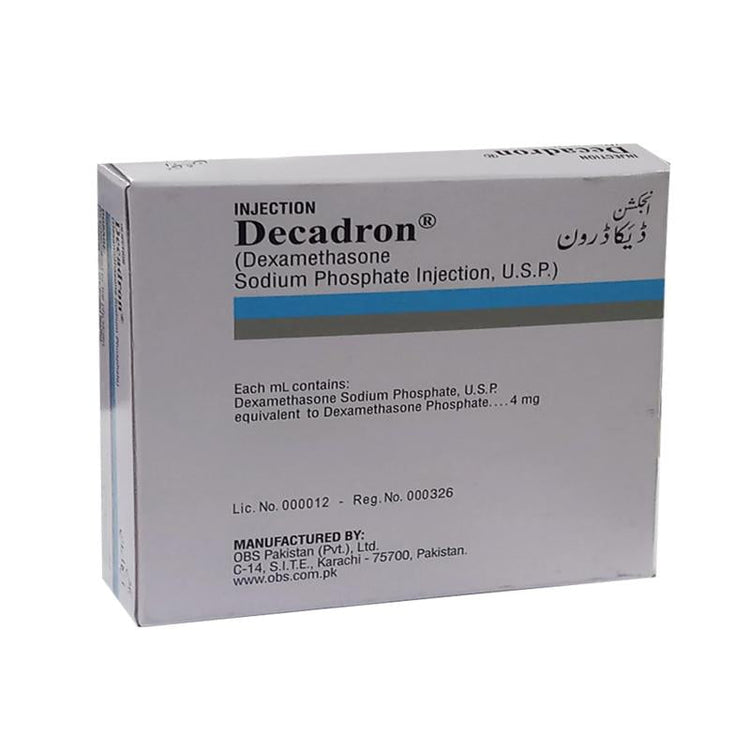Your cart is currently empty.
Decadron 4 mg/ml Injection – Box of 25 Ampoules (1 ml each)
: Available:
QUESTIONS & ANSWERS
Have a Question?
Be the first to ask a question about this.
Category:

Description
Decadron injection (dexamethasone sodium phosphate) is a potent corticosteroid used to reduce inflammation, suppress immune responses, and manage allergic and certain endocrine conditions. Each ampoule contains 1 ml of solution delivering 4 mg dexamethasone. It is used under medical supervision, often in hospitals or clinics.
Ingredients
-
Active ingredient: Dexamethasone sodium phosphate, equivalent to 4 mg dexamethasone per 1 ml ampoule.
-
Excipients / inactive ingredients: (may include buffer, stabilizers, water for injection)
Drug Class
Corticosteroid / Glucocorticoid
Dosage Form
Sterile injection (aqueous solution) — 1 ml ampoule delivering 4 mg dexamethasone.
Uses (Indications)
Decadron injection may be used in:
-
Management of severe allergic reactions and anaphylaxis
-
Control of inflammation and edema (e.g., cerebral edema, spinal cord compression)
-
Acute exacerbations of asthma or COPD
-
Autoimmune, rheumatic, dermatological conditions
-
As adjunct therapy in certain endocrine or hematologic disorders
-
As part of chemotherapy regimens for antiemetic or adjunctive steroid effects
-
To suppress immune responses, e.g. in transplant protocols
(References: MedlinePlus, Drugs.com)
Dosage
-
Adults: Typical injectable doses vary widely depending on the condition. Doses of 0.5 to 24 mg (IM or IV) daily have been used in clinical practice.
-
For intrajoint or local injection: e.g. 2–4 mg for large joints, 0.8–1 mg for small joints.
-
Children: Dose based on body weight (e.g. 0.15 to 0.6 mg/kg daily IV or IM) in some guidelines.
-
The specific regimen (frequency, tapering schedule) must be determined by a physician.
In Case of Overdose
-
Symptoms: adrenal suppression, hyperglycemia, fluid retention, hypertension, electrolyte imbalance, immune suppression, Cushingoid features
-
Management: supportive care, gradual tapering of corticosteroids, monitoring of metabolic and endocrine parameters
Missed Dose
-
In clinical/injection settings, “missed dose” is not usually applicable as doses are given under supervision.
-
Always follow medical direction; do not self-administer or double dose.
How to Use / Administration
-
Administer via intravenous (IV) or intramuscular (IM) injection using aseptic technique.
-
For IV, infusion or slow administration is preferred to avoid sudden hemodynamic changes.
-
In joint or tissue injection (if indicated), local administration is done under sterile conditions.
-
Physician must calculate dose, adjust for patient’s condition, and monitor.
When Not to Use (Contraindications)
-
Known hypersensitivity to dexamethasone or corticosteroids
-
Systemic fungal infections
-
Untreated infections (unless treated)
-
Active tuberculosis (unless under treatment)
-
Peptic ulcer disease (active)
-
Uncontrolled viral, bacterial, fungal, or parasitic infections
-
Use with caution (or avoid) in patients with uncontrolled diabetes, hypertension, glaucoma, osteoporosis, mental health disorders, severe renal or hepatic disease
-
In pregnancy or lactation, use only if benefit outweighs risks (pregnancy category C)
Side Effects
Common / less serious:
-
Increased appetite, weight gain
-
Insomnia, restlessness
-
Mood changes (irritability, euphoria, depression)
-
Abdominal discomfort, dyspepsia
-
Hypertension, fluid retention
-
Elevated blood sugar levels
-
Acne, skin thinning, bruising
Serious / less common:
-
Adrenal suppression
-
Increased susceptibility to infections
-
Peptic ulcers or GI bleeding
-
Osteoporosis, bone density loss
-
Cataracts, glaucoma
-
Muscle weakness, myopathy
-
Psychiatric effects (psychosis, depression)
-
Electrolyte imbalance (hypokalemia)
-
Delayed wound healing
-
Allergic reactions (rare)
Precautions & Warnings
-
Monitor blood pressure, blood glucose, electrolytes, signs of infection
-
Taper dose when discontinuing long-term therapy to avoid adrenal insufficiency
-
Avoid abrupt withdrawal, especially after prolonged use
-
Use lowest effective dose for the shortest duration
-
Be cautious in patients with comorbidities (diabetes, hypertension, peptic ulcer, osteoporosis, mental illness)
-
Avoid live vaccines during therapy, as immune response may be suppressed
-
Monitor ocular health (for glaucoma, cataracts)
-
Inform surgical/dental teams of steroid therapy before procedures
Drug Interactions
Potential interactions include:
-
NSAIDs (e.g. ibuprofen) – increased risk of GI bleeding
-
Anticoagulants (warfarin) – may alter anticoagulant effect
-
Diuretics (esp. potassium-loss diuretics) – risk of hypokalemia
-
Insulin / oral hypoglycemics – may require dose adjustment due to hyperglycemic effect
-
Cyclosporine, tacrolimus – increased risk of immunosuppression
-
Vaccines (live attenuated) – may have reduced efficacy or increased risk
-
Certain antifungals, anticonvulsants, rifampin, others – may affect metabolism of dexamethasone via CYP - affecting levels
Storage / Disposal
-
Store at controlled room temperature (usually up to 25–30 °C), protect from light
-
Do not freeze
-
Use before expiration date
-
Dispose unused or expired ampoules as per medical waste guidelines
Control Drug Status
-
Dexamethasone is not typically classified as a narcotic or controlled drug, but it is a prescription medicine requiring medical oversight.
Quick Tips
-
Always use under physician supervision; do not self-administer
-
Monitor for side effects regularly (blood sugar, BP, signs of infection)
-
Use the minimal effective dose and taper off gradually
-
Avoid concomitant use of NSAIDs unless necessary
-
Inform healthcare providers (surgeons, dentists) about your steroid therapy
-
Keep vaccination schedule and live vaccines under supervision during therapy
Your order of 100$ or more gets free standard delivery.
- Standard delivered 4-5 Business Days
- Express delivered 2-4 Business Days
Orders are processed and delivered Monday-Friday (excluding public holidays)
eMarket members enjoy free returns.
Related Products

Categories
Custom HTML Text
-
Free Delivery
From Rs 5000
-
Support 24/7
Online 24 hours
-
Free return
365 a day
- Choosing a selection results in a full page refresh.
Added to cart successfully. What's next?

Product type: 1
1 x $00.00






















 Chat with Us
Chat with Us